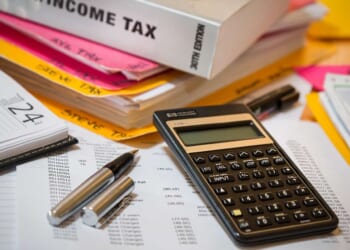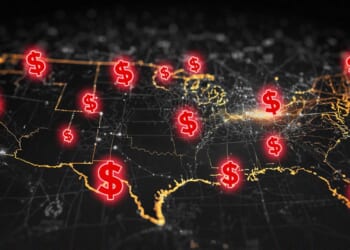How independent should a central bank be?
That question is at the heart of an intensifying showdown between President Donald Trump and the Federal Reserve, which sets interest rates.
President Trump wants to lower those rates to keep the economy humming despite the slowdown his far-reaching tariffs threaten to trigger. But Jerome Powell, the Federal Reserve’s chair, isn’t ready to move. He wants to wait until the impact of those tariffs becomes clear.
Why We Wrote This
President Donald Trump’s threats to fire Fed Chair Jerome Powell likely won’t achieve the economic boost the president seeks. What levers do – or should – presidents have to manipulate America’s traditionally independent Central Bank?
In a hurry, Mr. Trump is now considering firing Mr. Powell. And as he turns up the pressure – calling the Fed chair names and questioning his acumen – he’s ignited a firestorm in legal and financial circles. Forcing him out would overturn nearly a century of legal precedent and could well undermine international confidence in the dollar.
The markets are already signaling deep concern. On Monday, the value of the dollar fell sharply against the Japanese yen, the British pound, and the euro, notching a 3 ½ year low. Chinese clients of Deutsche Bank were replacing some holdings of U.S. debt with European debt, the bank said. Overall, stocks fell precipitously.
The importance of independence
Historically, the advantages of central bank independence are pretty clear. A study for the European Central Bank of 155 nations over 50 years found that nations with more independent central banks enjoyed more stable prices than those with less independent ones.
It’s easy to see why. Political leaders often push for lower interest rates to juice the economy and enhance their political prospects.
Without an independent entity to help slow an overheated economy, inflation surges and consumers end up paying higher prices. That is why, since the 1990s, many nations have moved to enhance the independence of their central banks.
“There’s virtual unanimity among economists that monetary independence from political interference – that the Fed or any central bank be able to do the job that it needs to do – is really important,” Austan Goolsbee, president of the Federal Reserve Bank of Chicago, told CBS’ Face the Nation on Sunday.
But that independence is more perception than reality, says Sarah Binder, professor of political science at George Washington University and co-author of the 2017 book “The Myth of Independence: How Congress Governs the Federal Reserve.”
Instead, the Fed depends on Congress for political support when it makes hard decisions, just as Congress needs the Fed to make those hard decisions. That is why in the 1930s, Congress passed several measures to insulate the central bank from politicians, especially the president.
Wrangling for influence
That hasn’t stopped the United States’ chief executives from trying to influence Fed decision-making.
Presidents such as Harry Truman and John Kennedy used various tactics to convince Fed chairs to keep interest rates low. President Lyndon Johnson, for example, summoned then-Fed Chair William McChesney Martin to his Texas ranch and shoved him against the wall, demanding lower interest rates. His successor, Richard Nixon, convinced then-Chair Arthur Burns to keep the economy growing in the 1972 election year. But that move also set the stage for the high inflation and slow growth, known as stagflation, that marked much of the 1970s.
President Trump has now upped the ante, threatening to fire Mr. Powell if he doesn’t lower rates.
“If I want him out, he’ll be out of there real fast, believe me,” Mr. Trump told reporters Friday. He followed up Monday with name-calling in a post on his Truth Social network: “There can be a SLOWING of the economy unless Mr. Too Late, a major loser, lowers interest rates, NOW.” (The Mr. Too Late moniker refers to Mr. Powell’s concession that the Fed waited too long before raising interest rates during the Biden administration, which led to a serious inflationary spiral.)
Whether a president can fire a Fed chair remains unclear. In 1935, the Supreme Court ruled that President Franklin Roosevelt’s dismissal of a member of the U.S. Federal Trade Commission was unjustified. But in later decades, the high court has moved at times to increase presidential power.
Most recently, Mr. Trump has asked the court to endorse his firing of board members of two independent agencies – the National Labor Relations Board and the Merit Systems Protection Board. If the Supreme Court accedes, that could raise the administration’s hopes that firing a Fed chair might be within bounds, even though the chair and governors of the Fed have more legal protections than those in other independent agencies.
Political shadowboxing?
Some of this conflict may be political shadowboxing, analysts say. Even if he doesn’t try to sack Mr. Powell, President Trump is laying the groundwork for blaming the Fed if the economy goes south. By saying he won’t quit despite presidential pressure, Mr. Powell is signaling to the markets that the Fed remains independent of political influence.
Still, the potential legal battle has rattled many, including one Republican senator who has gone public.
“I don’t think the president, any president, has the right to remove the Federal Reserve chairman,” Republican Sen. John Kennedy of Louisiana told NBC on Sunday. “I think the Federal Reserve ought to be independent.”
And the market fallout is undeniable, as traders begin to question the stability of the dollar and the credibility of future administrations in addressing inflation. In the stock market, the bellwether S&P 500, Dow Jones Industrial Average, and Nasdaq composite indexes all fell some 2.5%. Gold, an alternative to the dollar as a haven during stock turmoil, reached record highs.
“Financial markets are voicing a loud rejection of a number of these policies, including trade policy, but especially attacks on the Federal Reserve,” says Mark Spindel, founder of Potomac River Capital, a Washington-based investment firm, and co-author of “The Myth of Independence” with Dr. Binder, of George Washington University.
“I’ve never believed the Fed is independent. I’ve believed it has operated in this political town interdependently. But tilting that balance of power back to the Oval Office has some pretty severe consequences,” he says.








